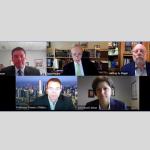I recently wrote about the CDC's new ridiculous mask plan, which recommended indoor masking based on areas of high t
Policy & Ethics
Last month, Gov. Dan McKee signed legislation making the Ocean State the first to legalize safe injection sites, dubbed “overdose prevention sites” by harm-reduction advocates. Hopefully, Rhode Island won’t run into the same fe
“There are almost no chronic conditions I can think of where you look at medical maintenance and say, ‘When are you going to get off it?’ We don’t ask diabetic patients when they’re going to get off their insulin.
Even those of us who are fully aware of the misery that our appalling system of drug regulation has heaped upon pain sufferers will find Maia Szalavitz's
Stories like this one continue to fill my news feed: Why refusing the COVID-19 vaccine isn’t just immoral – it’s ‘un-American.'
The Federalist Society recently organized a panel discussion on how to end the opioid crisis. One of the four participants was Dr. Jeffrey Singer of the Cato Institute, who is also a member of the ACSH's Board of Scientific Advisors:
The CDC caused an uproar in late July when it again recommended that fully vaccinated individuals mask up to reduce the spread of the SARS-COV-2 Delta variant. We published two articles in response to the agency's new guidelines. Dr.
I personally know a few dozen physicians.
Are you an adult capable of making informed decisions to protect your health? If you live in New York City, the answer is “no.” That's because NYC is all but requiring its residents to get a COVID-19 vaccine.
Prescription Drug Monitoring Programs (PDMPs) have been used in the United States since the early 20th century.












